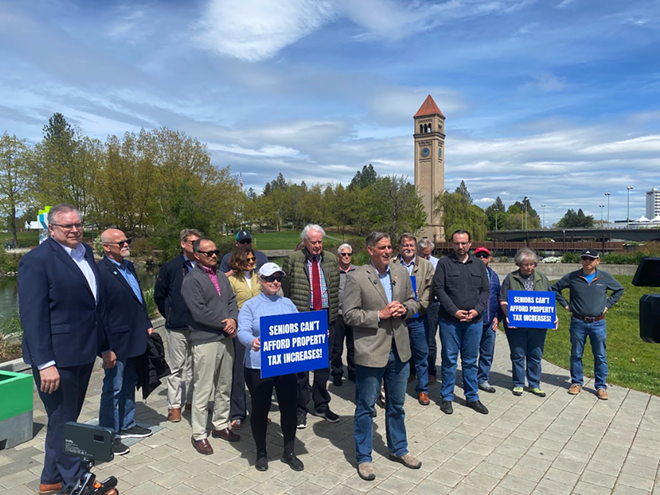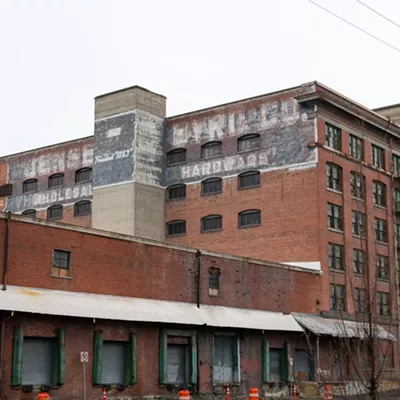
Last week, at Mayor Lisa Brown’s request, the Spokane City Council voted to put a massive property tax levy on the August ballot.
The idea of raising taxes was, obviously, controversial. But Brown argued that financial mismanagement by her predecessor had left the city with no other options, and that the tax levy was necessary to maintain existing police and fire service levels and prevent significant layoffs.
“This levy is not just an investment in services, it is an investment in people,” Brown said in a statement on the night of vote.
But today — less than 10 days after the vote to place the levy on the ballot — Brown changed course, calling for the levy to be postponed and pulled from the August ballot. She said the delay is necessary to allow more time for financial analysis and to “really engage more deeply with the community."
“I want to make sure we do this right,” Brown said in a May 8 press conference announcing the decision.
Brown still thinks the levy will be necessary at some point in the near future — possibly during the November election. The city’s budget is in a really bad place, with a $25 million deficit in the general fund and an even greater deficit across all other accounts, Brown said.
“The deficit is not going to go away,” Brown said. “In fact, structural deficits get worse if you don’t address them in a timely way.”
Brown’s decision to reverse course came as a big surprise.
“I was stunned, I did not know this was even being considered,” says City Council member Michael Cathcart.
Cathcart and fellow conservative City Council member Jonathan Bingle have been vocally opposed to Brown’s levy — arguing that it was vague, lacking guardrails, and an unnecessarily high burden that taxpayers would struggle to afford.
If passed, the proposed tax increase of $1 per $1,000 of assessed value, in perpetuity, would have raised an estimated $38 million each year to start, with the median Spokane homeowner paying $337 each year, according to the city’s analysis. Two-thirds of the funding would have been used to maintain existing service levels, and one-third would have gone to “new city-wide and neighborhood investments,” according to a memo of talking points the mayor sent to Council members last month.
In a different memo to Council members, Brown warned that “severe reductions” could be necessary if the levy failed — including the layoff of 50 police officers, 30 firefighters and an additional 70 employees. She also said the levy was necessary to address "financial shortcomings left by prior leadership over the last three years."
Cathcart and other opponents of the levy have expressed doubt about voters’ willingness to support a massive tax increase that comes with few new services and largely maintains the status quo — especially in light of inflation, rising property values and the fact that several other regional tax levy proposals have failed during recent elections.
Brown was slightly more optimistic.
“I actually think the chances for the levy to pass were better than 50%,” Brown said. “But that’s probably not good enough.”
Brown says her decision to postpone the levy was prompted in part by conversations she had with people during the weekend Expo '74 activities at Riverfront Park. She heard “very positive feedback,” she says, but also lots of questions about the levy’s implications.
Postponing the levy will give the city time to meet with neighborhood councils and community members to understand their concerns and provide more information about how the city got to this point, and what the implications of the levy’s failure would be, Brown said.
Postponing the levy will also give the city time to complete its mid-year budget review, she said. She is planning to bring City Council a “fairly significant set of ideas” about potential reductions and efficiencies.
“Of course, we hope to maintain the services that everybody counts on in Spokane, and that is going to be challenging with this budget deficit,” Brown said.
Brown’s surprise announcement came just a few hours before Spokane County Treasurer Michael Baumgartner was scheduled to hold a press conference expressing his opposition to the levy.
The mood at his press conference this afternoon was celebratory.
“This is what winning looks like,” Baumgartner said. “It’s a great day for fiscal responsibility, and a great day for all of us that think that property taxes are too high and that want government officials to look at other solutions.”
Baumgartner is running as a Republican contender for the 5th Congressional District seat being vacated by U.S. Rep. Cathy McMorris Rodgers.
When asked if he was holding the press conference in his capacity as Spokane County Treasurer or as a congressional candidate, Baumgartner said he was there as a “concerned citizen, first and foremost.”
Baumgartner was flanked by supporters holding signs that read, “Seniors can’t afford property tax increases!” He was also joined by Cathcart, former City Council member Steve Corker and 6th District State Rep. Mike Volz.
“Mayor Brown and other folks that want to be tax-and-spend liberals, what they need to do is work with other government entities and look at putting public safety first and making some tough decisions on prioritization," Baumgartner said. "There are other options. Anyone that tells you that the only solution here is to pass this new tax or lose public safety, they're just not being honest."

When asked how he personally would balance the city’s budget, Baumgartner acknowledged that he isn’t a City Council member or mayoral candidate, and deferred to Cathcart.
Cathcart says the city has a number of potential options that have yet to be explored.
“It’s time for us to really start to look at how we tighten our belts,” Cathcart said. “Can we go back to the unions and renegotiate? Can we go to our fire department and look at new shifts? ... Reducing certain city departments and making things more efficient?”
Brown has said contracts with city unions that were negotiated by her predecessor are a major factor in the city’s current financial problems. Cathcart voted to approve those contracts at the time, but he says it was necessary then because the city was in danger of losing good employees. He thinks another round of negotiations could be successful this time because “now there’s a mayor saying we are going to cut, cut, cut — we didn’t have that the last four years.”
Cathcart thinks a levy should be an absolute last resort. It might be more palatable to voters, he says if it was only 50 cents per $1,000 in assessed value instead of $1 per $1,000 — and if the city could show voters they had already made significant reductions.
Council President Betsy Wilkerson attended the press conference to watch. Afterwards, she said that, despite the criticism, she didn’t hear any better ideas proposed. She said it’s frustrating when people expect the new mayor to “solve the world’s problems” after just four months in office.
“Work with us, not against us, and I think we can get there,” Wilkerson said. “But you’ve got to be open to it."
























